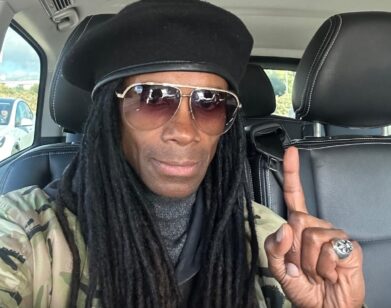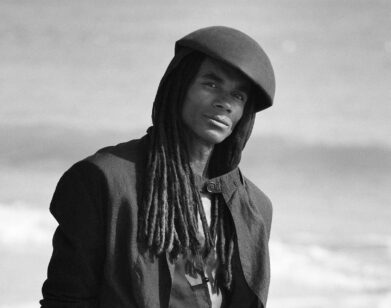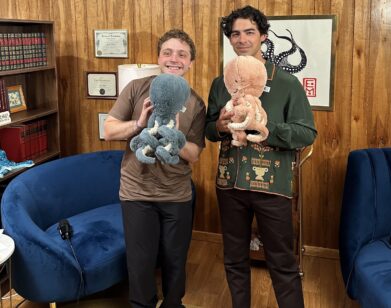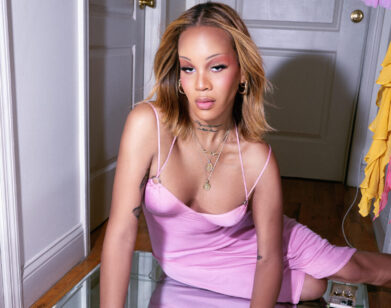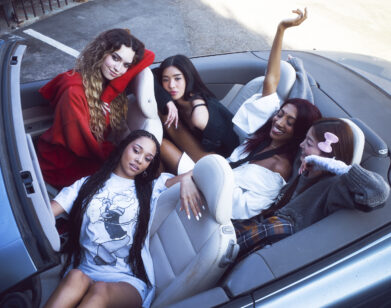Air Revisits the Moon
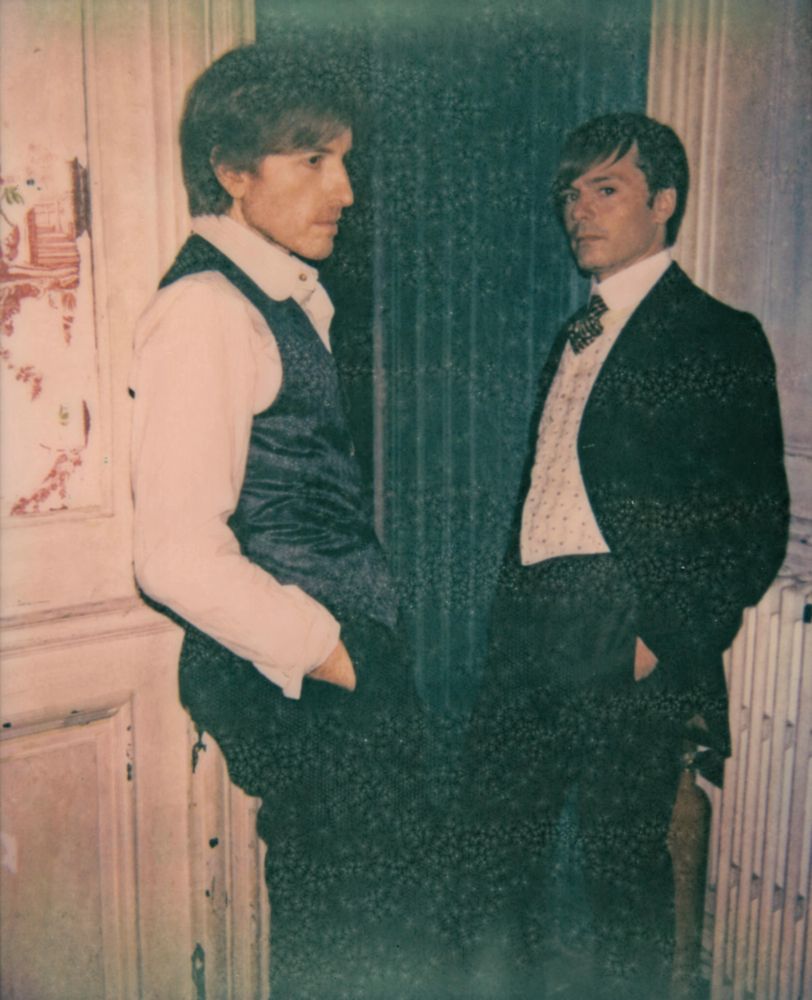
ABOVE: NICOLAS GODIN (LEFT), JEAN-BENOIT DUNCKEL (RIGHT)
It’s been 14 years since “Sexy Boy” was released, revealing Air to the world. Ever since, the French electro synth-pop duo have worked feverishly on a plethora of projects—they have written music for Sofia Coppola’s films (a full-length album for The Virgin Suicides and individual songs for Lost in Translation and Marie Antoinette), a ballet, a video game, a novel by Italian writer Alessandro Baricco. Oh, and they also were awarded French knighthood (Chevalier de l’Ordre des Arts et Lettres) in 2005.
Air’s most recent project? Creating a soundtrack to a restored version of Georges Méliès masterpiece of early cinema, 1902’s Le Voyage dans la lune. The film is often touted as the first science-fiction film and the first film to combine animation with live acting. Fourteen minutes long, Le Voyage dans la lune is loosely based on books by Steampunk idols, H.G. Wells and Jules Verne. Even if you have not seen the film itself, you cannot escape the countless references to Méliès’ most celebrated work, especially the scene in which the rocket lands in the eye of the moon—it inspired the Smashing Pumpkins video for “Tonight, Tonight,” Scorsese’s Hugo is based on the life of Méliès, and Terry Gilliam has stated that “the last scene of The Imagination of Doctor Parnassus was meant as an homage to the end of Méliès’ life.”
Air’s soundtrack accompanies a recently restored, color version of the film. The color was added to each frame by hand, each painter responsible for just one color. The effect is mesmerizing, especially the glowing green of the Moon monsters. You wonder if this is where the idea of “little green aliens” first emerged, just as Coca-Cola is responsible for Santa Claus’ scarlet suit. Air’s soundtrack oscillates between menacing and playful; a collage of heavy, regular drum beats later, strange synth sounds, soft piano and guitar-led pop. After presenting the film at Cannes in May, Air transformed their soundtrack into their newest album, also entitled Le Voyage dans la lune. It will be the band’s 10th album.
The thoughtful duo behind Air, Nicolas Godin and Jean-Benoît Dunckel, took some time to tell us a little more about their film project, their fascination with space, and trying to find the right amount of self-confidence.
EMMA BROWN: How long have you both been in New York?
JEAN-BENOIT DUNCKEL: Three days, already. We had a party yesterday at the French Embassy.
BROWN: At the embassy! How did you manage that?
NICOLAS GODIN: We are knights; we were knighted by the Republic, so we get those kind of privileges. [laughs]
BROWN: Are you going to get any leisure time while you’re here?
GODIN: I have a drink with a friend at 6, that’s about it! [laughs] I took a walk; when you are jet-lagged, you wake up early in the morning, so I went to the park this morning and it was beautiful.
BROWN: How did you become involved with Le Voyage dans la lune?
DUNCKEL: The two foundations that restored the movie, Groupama Gan and Technicolor, they thought of us because of our past regarding movie soundtracks—we did Sofia Coppola’s The Virgin Suicides and other soundtracks. They found out about us because we are well-known abroad and I think their wish was to have the movie travel abroad through our name, so they asked us to do the music for the movie and we did. We had one month to do it. I think they don’t regret it. It is also good exposure [for us] because of the movie, [it] was already a blockbuster before, I know that it’s referenced by movie directors such as Scorsese, Steven Spielberg, Woody Allen—all the American directors that studied classic cinema history at school.
BROWN: What did you hope to add to the project?
GODIN: Something mysterious; the movie’s very funny as it is and we wanted to add some sounds that have more to do with fantastic soundtracks, something more science fiction. After 30 seconds, we put some weird sounds so that people can get worried. That’s what we add, that kind of vibe.
BROWN: That’s interesting, because I’ve only seen the film with your soundtrack, and it seemed very ominous. How did this process differ from the other soundtracks you’ve done in the past?
DUNCKEL: It’s a muted movie—there’s no sound design, no lyrics, no words, nothing—so we had to tell a musical story to drive the movie somewhere. The movie is so old, so spooky, that we have to make a decision about the anachronism problem: should we do something like the music of the Belle-Époque, or should we drive the entire strand of the music into something really modern, crazy and psychedelic. We decided to follow the second direction; we have incorporated some beats, some heavy percussions, which makes it almost like hip-hop sometimes. We didn’t care about the reaction of the people, actually, the conservative ones, we were not scared of what they would think of it because it can shock people to see such different music on the pictures. The music also had to be strong enough to be on an album, so it’s a bit like pop still, because you have melodies, you have structures, and sometimes you have voices. It was a hybrid project because it was half an album, but half a movie soundtrack, too.
BROWN: Did you know it was going to become a full album?
GODIN: Not right away. We were so happy and excited about the result, so the album appeared to us like that. It was not a decision, it was, “Oh my God, is this an album? It sounds like it.” We were the first to be surprised about having an album without being conscious of it.
BROWN: So that’s never happened to you before?
GODIN: Not that way. That’s why it’s a pretty unique album, because of the circumstances of its birth. [laughs] [For] Virgin Suicides, we knew we were going to make an album, we made the album and we gave it to Sofia and she decided what she wanted to do, but with this thing it was afterwards.
BROWN: Méliès is quite prolific.
GODIN: [laughs] [All of his films] are all the same, that’s why he disappeared. He was not able to diversify; he was making the same movie all the time.
DUNCKEL: He has done more than 300 movies. Short movies, but still, it’s a lot of work.
BROWN: Not going to write a soundtrack for the entire Méliès opus then…
DUNCKEL: [laughs] No. 300 albums, can you imagine?
BROWN: You worked with Mike Mills on some of your earlier music videos, have you seen his film Beginners?
GODIN: Yeah, it’s great. It’s funny, because we met his dad a few times. It’s just so moving what he did, it’s strong; I wonder how I could get through that without being overwhelmed.
BROWN: Space and space travel is a recurring theme in your work; why is that?
DUNCKEL: We want to make the people go away from the earth, from their problems. Ourselves, when we think about that, we think about space. I think that really key is the fact that we are little animals walking on the ground, we have a certain life time, we are acting and interacting with different people, and we are trying to build things, but we are just some sort of virus compared to the entire sky. You always have to remember that the moon, the earth, the sun, they are like the real universal objects. We don’t stay, we are just passing by, and it makes life more beautiful to think that way. More relaxing to think that way, that nothing is really important, because you give yourself much more confidence and you forgive yourself more things when you think about that. Sometimes in our life we tend to focus on stressing problems—money or relationships—to me, it is important to stay awake, to have your eyes looking to the real nature.
BROWN: It’s been 15 years since your first album came out; if you could go back in time and meet yourselves 15 years ago, what advice would you give your younger selves?
DUNCKEL: I would say to myself, “Don’t worry, you are good.”
GODIN: “Enjoy.” I [get] stage fright, so there are amazing shows that we did and I didn’t enjoy them because I was scared.
BROWN: Do you still get stage fright?
GODIN: Yeah, yeah. Even for Le Voyage dans la lune, when we went to the Cannes Film Festival I was so stage frightened, I was scared that they would “Boo” or not like it.
DUNCKEL: It’s good to [get] stage fright. It is necessary to be scared, otherwise you have too much confidence in yourself and you start to get pretentious and do shitty things. It’s good to not be so confident in yourself.
GODIN: Yeah.
BROWN: But you would still reassure yourself that you are “good” if you could go back in time?
GODIN: [laughs] Good point!
DUNCKEL: Yes, because I need to. I am too much [the other way].
BROWN: Are you taking a break from writing while you’re on your press tour?
DUNCKEL: We are always working, so we are working on new materials but with been really, really busy with the promo [for Le Voyage dans la lune]. Also we’ve done some other things—we’ve done music for a video game, we’ve planned to do another film. There’s always something new to do.
BROWN: It seems like you’ve written music for every format—video games, films, a book…
GODIN: A ballet.
BROWN: Are you going to do a play?
GODIN: The two things I’d like to do are music for a play and music for a magician.
BROWN: What has been your favorite experience so far?
DUNCKEL: I think The Virgin Suicides; we went to Sundance, we went to LA, we traveled so much, we met new friends, we got a little bit into the Hollywood world and it was so fun. I think it created an interest for Air, and because of that we played at the Hollywood Bowl in 2004. I think that in California we are an important band—or not important, but we are not so small, so it was really important for our career and all the parties and all the travels have been really, really cool.
BROWN: But I feel like everyone in America know who you are, or at least your song “Sexy Boy.”
GODIN: [laughs] Yeah, I think I will play that song forever, each time we do a show. When we play it people are crazy, it’s like the song is so important. It’s cool to have written a classic.
LE VOYAGE DANS LA LUNE IS AVAILABLE TO ORDER NOW ON AMAZON AND iTUNES.

